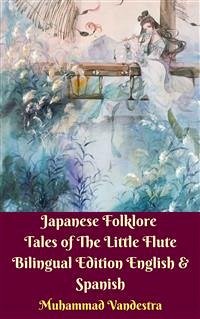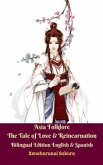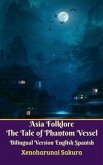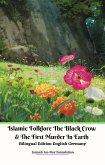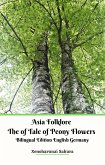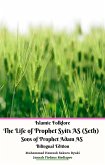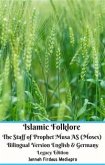Long since, there lived in Yedo a gentleman of good lineage and very honest conversation. His wife was a gentle and loving lady. To his secret grief, she bore him no sons. But a daughter she did give him, whom they called O’Yoné, which, being interpreted, is “Rice in the ear.” Each of them loved this child more than life, and guarded her as the apple of their eye. And the child grew up red and white, and long-eyed, straight and slender as the green bamboo. When O’Yoné was twelve years old, her mother drooped with the fall of the year, sickened, and pined, and ere the red had faded from the leaves of the maples she was dead and shrouded and laid in the earth. The husband was wild in his grief. He cried aloud, he beat his breast, he lay upon the ground and refused comfort, and for days he neither broke his fast nor slept. The child was quite silent. Time passed by. The man perforce went about his business. The snows of winter fell and covered his wife’s grave. The beaten pathway from his house to the dwelling of the dead was snow also, undisturbed save for the faint prints of a child’s sandalled feet. In the spring-time he girded up his robe and went forth to see the cherry blossom, making merry enough, and writing a poem upon gilded paper, which he hung to a cherry-tree branch to flutter in the wind. The poem was in praise of the spring and of saké. Later, he planted the orange lily of forgetfulness, and thought of his wife no more. But the child remembered. Hace mucho tiempo, vivía en Yedo un caballero de buen linaje y conversación muy sincera. Su esposa era una mujer amable y cariñosa. Para su dolor secreto, ella no le dio hijos. Pero una hija que ella le dio, a quien llamaron O'Yoné , que, interpretada, es "Arroz en la oreja". Cada uno de ellos amaba a este niño más que a la vida, y la protegía como la niña de sus ojos. Y el niño creció rojo y blanco, y con los ojos largos, liso y esbelto como el bambú verde. Cuando O'Yoné tenía doce años, su madre se dejó caer con la caída del año, enferma y picado, y antes de que el rojo se hubiera desvanecido de las hojas de los arces, estaba muerta, envuelta y tendida en la tierra. El esposo estaba loco en su dolor. Lloró en voz alta, se golpeó el pecho, se tumbó en el suelo y rechazó la comodidad, y durante días no rompió el ayuno ni durmió. El niño estaba bastante callado. El tiempo pasó. El hombre forzosamente se ocupaba de sus asuntos. Las nieves del invierno cayeron y cubrieron la tumba de su esposa. El sendero batido desde su casa hasta la morada de los muertos también era nieve, sin interrupciones, salvo por las débiles huellas de los pies calzados con sandalias de un niño. En la primavera, se ciñó la bata y salió a ver el cerezo floreciendo, lo suficientemente feliz, y escribiendo un poema sobre papel dorado, que colgó de una rama de cerezo para aletear con el viento. El poema fue en alabanza de la primavera y del sake . Más tarde, plantó el lirio anaranjado del olvido, y ya no pensó en su esposa. Pero el niño lo recordó.
Bitte wählen Sie Ihr Anliegen aus.
Rechnungen
Retourenschein anfordern
Bestellstatus
Storno

